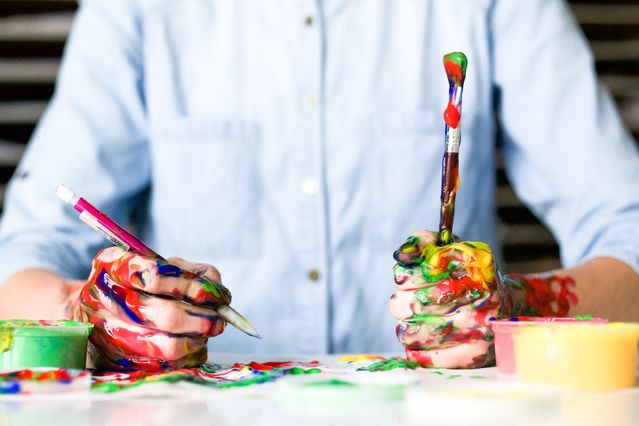Openness
How Openness to Experience Boosts Creativity and Well-Being
Research shows openness is key to creativity.
Posted January 31, 2020 Reviewed by Devon Frye

How open to new experiences are you?
If you ever feel as if your work life falls into a rut, consider how open (or not) you are.
In the field of psychology, openness to experience refers to our measurable individual interest in art and beauty, our attention to our sensations and feelings, our intellectual curiosity, our preference for variety, and our active imagination. Put simply, it is the drive to explore novel aspects of human experience and the willingness to consider perspectives different than your own.
Openness is also an essential trait of successful innovators and creatives throughout history. With an appreciation of diverse perspectives and a willingness to try new things, you can better navigate daily challenges and discover novel solutions. Studies even show that openness to experience positively correlates with increased job performance and more creativity.
While most of us would like to think of ourselves as being open to trying new things, the reality is that we are far less so than we think. In a recent survey conducted by Shane Snow—author of Dream Teams: Working Together Without Falling Apart—and his team, 95 percent of respondents reported that they are more open-minded than the average American (which statistically, of course, cannot be the case).
Even though we value objectivity, curiosity, and an adventurous spirit, humans are creatures of habit—and as we grow older, we can get stuck in our routines or cognitive ruts. We succumb to familiarity bias and seek the easy, familiar, or safe solution. As such, it takes more effort to practice divergent thinking and open yourself to novel, creative ideas as you age.
Fortunately, recent studies show that you can train your brain to be more open. Openness to experience—like creativity—is more than a personality trait: It’s a skill to be cultivated over time. Furthermore, it can be cultivated by a variety of methods, from intellectual engagement to mindfulness, cognitive reasoning to the appreciation of beauty. As scientists and artists who score highly on this trait show, there are a number of practices and behaviors you can build into your days in order to increase your openness.
Here are the top 3 practices I recommend in order to jumpstart creativity and enrich your life:
1. Nudge the edge of your comfort zone.
As we grow older, we fall into cognitive patterns and learned behaviors. While these patterns provide structure to our days, they can also limit our perspectives and possibilities to our “comfort zone.” Why? Because we fear the unknown, even if that unknown is something relatively innocuous like trying a new podcast about a topic you’re unfamiliar with.
One simple, yet sometimes uncomfortable, way to break yourself open to new experiences is to discover and push the boundaries of your comfort zone.
Healthy doses of the right kinds of fear help us reach beyond our comfort zone and grow. But when you dig into subtler daily patterns of how you act, you might notice a pervasive pattern of unnecessary fear driving you. Recognizing that some of these patterns are distractions, or old habits that no longer serve you, allows you to redirect your focus to growth. Take the time to reflect on those fears or stressors and find simple ways that you can push beyond them on a regular basis.
2. Prototype over perfection.
In the process of inventing the light bulb, Thomas Edison made 1,000 unsuccessful attempts. Once he succeeded, a reporter asked him, “How did it feel to fail 1,000 times?” Edison’s response: “I didn’t fail 1,000 times. The lightbulb was an invention with 1,000 steps.”
Testing the edges of your comfort zone may mean exploring uncharted territory. One important thing to remember whenever you’re trying something new—whether it’s public speaking or trying yoga for the first time—is that few people excel on their first attempt.
Rather than stress over your “failings,” or how far you have to go, get curious. Fear of failure often holds us back. So rather than think of experiences in terms of success or defeat, be an audacious experimenter! Continue to learn from mistakes or setbacks, fine-tune your methods, and creep ever closer to mastery or simple amusement. After all, not everything’s a competition.
3. Follow your curiosities, not your passions.
“Follow your passion” is misleading advice. As psychologist Carol Dweck found in her studies on growth mindset, this mentality of pursuing a singular vocation can narrow focus and imply an easy path to success that only discourages students when they inevitably encounter failure.
If everyone is finding a calling or a hidden talent, it implies that pursuing a passion is easy work. You come to believe that if you haven’t found yours, you must be doing something wrong. Yet, in fact, you are stuck in this one-track mindset and so you work harder with the same frustration, leading to anxiety, disappointment, and inevitable burnout.
While passion is fickle and high-voltage, curiosity, on the other hand, is deep and abiding. When you approach something with a curious mindset, you are seeking growth and newness for the sake of novelty. Stay curious by pursuing topics that intrigue you, or consciously searching for gaps in your knowledge.
Next time you feel stuck in your ruts and routines, or notice the tightness in your stomach that signals you’re at the edge of your comfort zone, remember these tips and see if you can push that boundary just a little bit further. You may be surprised at the curious and creative paths your openness will take you down.
LinkedIn Image Credit: nd3000/Shutterstock
References
Openness to Experience and Work Outcomes: Exploring the Moderating Effects of Conscientiousness and Job Complexity. Gouri Mohan & Zubin R.Mulla. Great Lakes Herald. Vol 7, No 2, September 2013.
The Influence of Openness to Experience on Perceived Employee Creativity: The Moderating Roles of Individual Trust. Xu, Sen; Jiang, Xueting; Walsh, Ian J. Journal of Creative Behavior, v52 n2 p142-155 Jun 2018.
Dream Teams 2018 IH Survey. Shane Snow. Dream Teams 2018.
Opening up Openness to Experience: A Four-Factor Model and Relations to Creative Achievement in the Arts and Sciences. Scott Barry Kaufman. The Journal of Creative Behavior, Vol. 47, Iss. 4, pp. 233–255. 2013.
Computations of uncertainty mediate acute stress responses in humans. de Berker, A., Rutledge, R., Mathys, C. et al. Nat Commun 7, 10996 2016.
Implicit Theories of Interest: Finding Your Passion or Developing It? Paul A. O’Keefe, Carol S. Dweck, Gregory M. Walton. Psychological Science, Volume: 29 issue: 10, page(s): 1653-1664. 2018.




